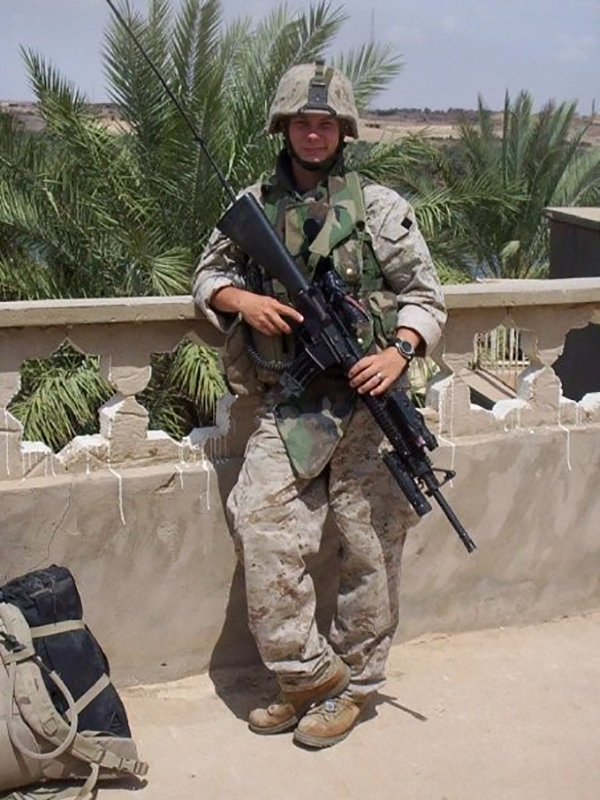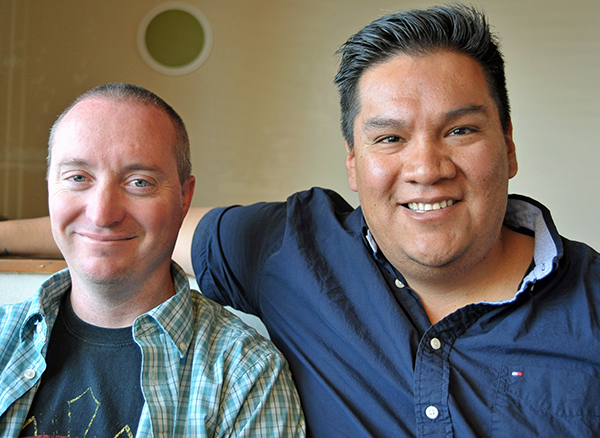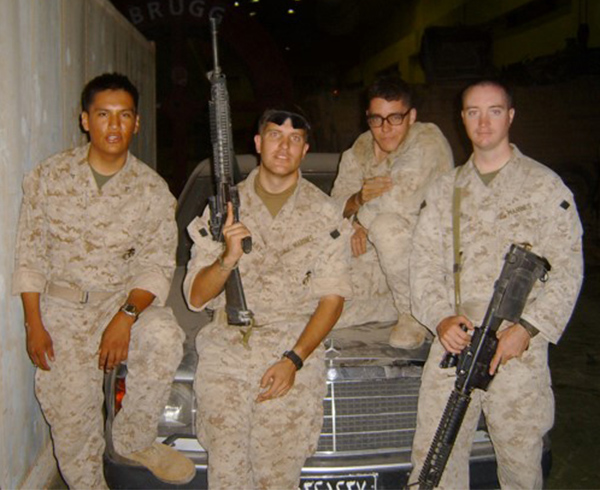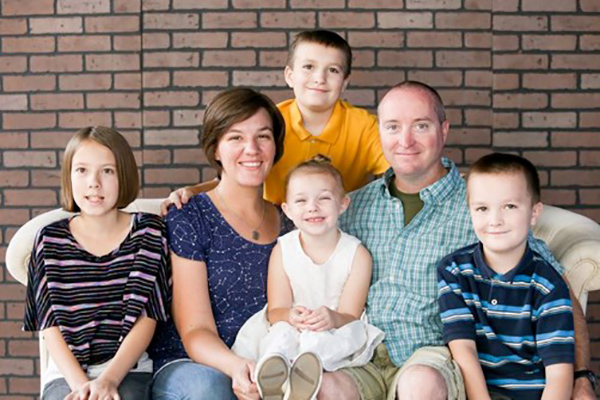A tale of friendship, loss, and love
A Sandia veteran recalls the story of one Marine’s death and the friend who carried his legacy through family

To John Bailon and Jeff Hunter, Memorial Day is personal. They served together as Marines in the war in Iraq and saw nearly two dozen comrades fall. “Memorial Day isn’t about those of us who served. It’s about the people who died fighting an enemy,” Hunter says. “It’s a select group. They didn’t just die. They were killed.”
Every name, every face has a story. One with special meaning to John (5823), a Sandia cyber technologist, centers on Hunter and fellow Marine Christopher Lyons, a story of shattering loss followed by surprising joy.
New kid on the block
John and Hunter met in Albuquerque as Marines in Delta Company 4th Recon Battalion. Their unit was too small to deploy alone so in January 2005 they were sent to California to train with Lima Company, a reserve infantry battalion out of Columbus, Ohio. The Albuquerque group was scattered, with John and Hunter going to different squads in the same platoon. Lyons befriended Hunter, the new kid on the block.
“All the Ohio guys knew each other. I’ll never forget getting to California and walking into the Quonset hut with all the cots inside. There was only one left; nobody wanted it. They gave it to me,” Hunter says. “Christopher moved his cot next to mine to help me out, make me feel welcome.”
Thus began a friendship that grew stronger as Hunter and Lyons were assigned to the same four-man fire team in their squad. “We figured out during the two months of training that we had a lot in common,” Hunter says. “We had great conversations.”

John says the Marines have a tribal dynamic, with the fire team the smallest tribe. “You literally work with your fire team 24/7,” he says. “You learn how they walk, what they eat, their temperament, how they handle stress, assess situations. There’s no personal space, no privacy. You’re with these people every day, learning about them. It’s a very personal experience, the first layer of family. Jeff and Chris had that from the very beginning.”
Lima Company was deployed to Al Anbar Province in Iraq in March 2005. Hunter and Lyons were still on the same fire team with Hunter the corporal in charge. They often found themselves together through long hours of guard duty, talking to stay awake. “Our friendship grew,” Hunter says. “You know how you meet people and become friends and know it will last a long time? We were like that. We talked about everything from the deeply spiritual to the mundane. We got into funny situations and life-and-death struggles. We made plans to see each other after the war. I only knew him for six months, but he was like a brother.”
Lyons also talked about his wife Bethany who was expecting their first child in April. He picked up the nickname Daddy Lyons because he talked so much about his family. “Christopher was artistic and poetic,” Hunter says. “He enlisted in the Marine Corps as a journalist but was assigned to be an infantryman in boot camp. He worked for a newspaper in Ohio and sent stories from Iraq that were published. He loved to write.”
When Lyons’s daughter Ella was born on April 27, he was called back from the front and saw her over web cam. “He was so excited,” Hunter says. “It was a big deal for him."

A mission gone wrong
Before dawn the morning of July 28, John, Hunter, Lyons, and their platoon set out to clear two small towns. That involved going door to door searching houses for weapons and insurgents. It was routine and they expected to be back for lunch. “Of all the missions to go wrong,” Hunter says. “We did far more dangerous things than we did that day.”
John’s squad started knocking on doors while Hunter’s stood guard on a rooftop. Hunter was now the squad leader and Lyons his radio operator. Half way through the first town, John’s squad approached a house and was fired upon. A bullet hit and killed the fire-team leader walking next to John.
"We were well trained and knew what we were doing. We were going to win. That’s what Marines do.”
Nine insurgents were in the house and while three ran out the back carrying AK-47s, the others continued firing on John’s squad. Hunter’s group shot at the men who ran but they got to a nearby building under construction and took cover. The firefight raged on both fronts. “It was very dynamic, very chaotic, but that’s the way combat is,” Hunter says. “We were well trained and knew what we were doing. We were going to win. That’s what Marines do.”
John says it was clear the insurgents were not locals but among the many foreigners from places like Syria, Yemen, and the Sudan who came to Iraq to die on a mission and fulfill their religious duty. “They were there to kill as many of us as they could and die doing so,” he says. “Those were the people we fought the most.”
Hunter says the company had lost about 20 Marines since it arrived in Iraq in March, “and we weren’t playing games at this point.” Tanks were called in to fire on the two houses. Afterward, people had to go in and make sure no one was still alive. The house under construction was picked first. “The captain asked for volunteers and I said my squad would do it,” Hunter says. “We were right there.”
‘Did we get it wrong?’
He took two fire teams with him while one watched from a rooftop. He asked Lyons to bring up the rear. “I was trying to keep him out of harm’s way,” Hunter says. “The first guy in takes the risk, and we rotate that role. I was going to lead us in.”
Hunter threw a grenade and fanned through the building. No bodies were found. “Did we get it wrong?” he recalls thinking. “I saw three people run in there.” From the rooftop someone shouted to check two animal pens in the back. Lyons was near them with another Marine, who walked into the first one. It was clear. At the second pen it was Lyons’s turn to go in first and as he did, he was hit in the head by bullet, in a small spot not covered by his helmet.
“I watched them go toward the pens and I remember thinking, ‘These guys are awesome. They look so professional. I was proud,” Hunter says. He looked away briefly then heard gunfire. “Christopher dropped in the doorway,” he says. “The shooter opened fire on the rest of us. All I could think about was Christopher’s family. He had to be alive and I was going to get him out of there.”
The gunfire continued for several hours as Hunter tried to get to Lyons. At one point, the shooter pulled Lyons into the pen and Hunter lost sight of his body. Eventually, a tank operator used heat-seeking equipment to locate and fire on the insurgent.
"I walked out, the door went up, and that’s the last time I saw him.”
Hunter was the first one through the door. The shooter was dead and he saw Lyons’s body in a corner of the dark room. “I can see his face. I can tell he’s gone. I’ve seen him asleep, I’ve seen him smile, seen him cry, seen him happy, seen him sad, and I can tell there’s no life in that face. I fall to my knees and free him from some rubble. I’m the only one in the room. No one followed me in. I was done, physically spent. I called for help and we got Christopher out of the hole. We called in the medevac. We laid him on the same bench he was sitting on when they brought us in that morning. I walked out, the door went up, and that’s the last time I saw him.”

A new family from the ashes of loss
John, Hunter, and the rest of the company returned to the US in October, and Hunter, who was awarded the Silver Star for his actions the day Lyons died, traveled to Ohio to visit with the families of fellow Marines who lost their lives. Bethany Lyons had reached out to Hunter through email while he was still in Iraq wanting to know more about her husband’s death, and she and Hunter struck up a correspondence. They met in Ohio and continued to write and visit each other after Hunter returned to Albuquerque.
“We fell in love,” Hunter says. “I was head over heels.” Hunter and Lyons were married April 28, 2006, and Hunter adopted Ella. Hunter and Bethany went on to have three children of their own.
Every year the family recognizes July 28, the day Christopher died. “We take the day off and do things as a family,” he says. “The day has special meaning.”
So does Memorial Day. “I was fighting for the guys standing next to me: my fire team, my squad, my platoon,” says Hunter, now a Bernalillo County Sheriff’s deputy. “Death in general is tough to deal with. But when it’s a violent death on foreign soil in a war zone, it’s even more so. Memorial Day is a time for the country to think about those things.”
As John reflects on the story of his friends Hunter and Lyons, he says he was proud to be part of a “company of heroes.”
“I was profoundly moved by the guys I served with,” he says. “And it goes deeper with the ones we lost in that deployment. They remind us to not let our fire burn out and to continue to live good lives and pursue our goals, be good fathers and good stewards. We must not waste an ounce of our lives in honor of the people who died.”